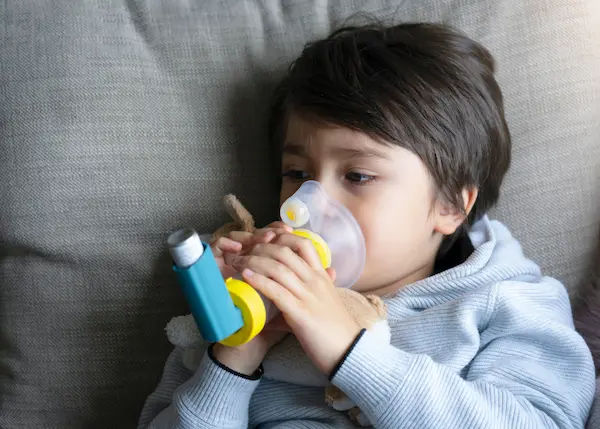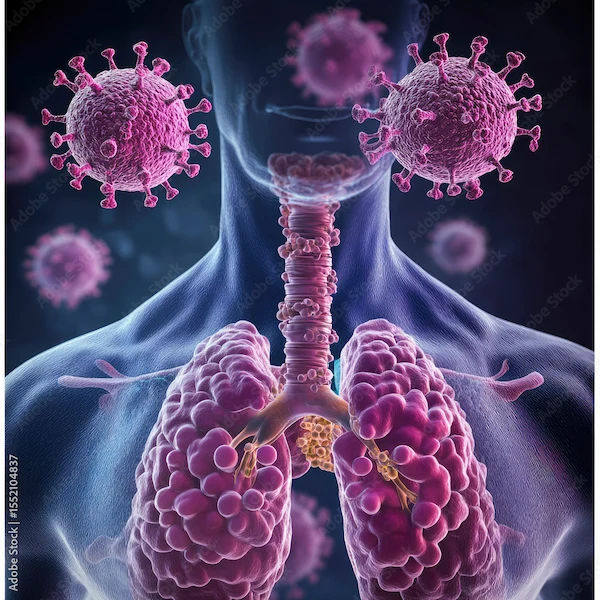Asthma Information on Symptoms and Treatment
Learn about asthma, its common symptoms, triggers, and effective treatment options. Understand how to manage asthma with medication, lifestyle changes, and personalized care plans.

Written by Dr. Md Yusuf Shareef
Reviewed by Dr. Rohinipriyanka Pondugula MBBS
Last updated on 26th Aug, 2025

Asthma is a common but serious respiratory condition that affects millions of people worldwide. If you or a loved one has asthma, understanding the symptoms, causes, and treatment options can help manage the condition effectively. This article will guide you through everything you need to know in simple, easy-to-understand terms.
What is Asthma?
Asthma is a chronic (long-term) lung disease that causes inflammation and narrowing of the airways, making it difficult to breathe. During an asthma attack, the airways swell, produce extra mucus, and tighten, leading to symptoms like wheezing, coughing, and shortness of breath.
While asthma cannot be cured, it can be managed well with the right treatment and lifestyle changes.
Consult a Top Pulmonologist
Common Symptoms of Asthma
Asthma symptoms vary from person to person, but the most common signs include:
- Wheezing – A whistling or squeaky sound while breathing.
- Shortness of breath – Feeling like you can’t get enough air.
- Chest tightness – A feeling of pressure or squeezing in the chest.
- Coughing – Often worse at night or early morning.
Some people experience mild symptoms occasionally, while others may have severe attacks that require immediate medical attention.
When to Seek Emergency Help
If you or someone else experiences:
- Extreme difficulty breathing
- Bluish lips or fingernails
- Rapid worsening of symptoms despite using an inhaler
- Inability to speak due to breathlessness
Seek emergency medical care immediately.
What Causes Asthma?
The exact cause of asthma is not fully understood, but it is believed to result from a combination of genetic and environmental factors. Common triggers include:
- Allergens – Dust mites, pollen, pet dander, mold.
- Respiratory infections – Colds, flu, or sinus infections.
- Air pollution & irritants – Smoke, strong odors, chemical fumes.
- Physical activity – Exercise-induced asthma.
- Weather changes – Cold air, humidity, or sudden temperature shifts.
- Stress & strong emotions – Anxiety or excessive laughter can trigger symptoms.
Identifying and avoiding your triggers can help reduce asthma flare-ups.
How Asthma Affects Your Health
If left unmanaged, asthma can lead to:
- Frequent hospital visits due to severe attacks.
- Sleep disturbances due to nighttime coughing.
- Reduced physical activity, affecting overall fitness.
- Long-term lung damage in severe cases.
However, with proper treatment, most people with asthma can lead active, healthy lives.
Treatment and Management of Asthma
Asthma treatment focuses on controlling symptoms and preventing attacks. Your doctor may recommend:
1. Medications
- Quick-relief inhalers (Rescue inhalers) – Used during an asthma attack to relax airway muscles (e.g., albuterol).
- Long-term control medications – Taken daily to reduce inflammation (e.g., inhaled corticosteroids).
2. Lifestyle Changes
- Avoid triggers – Keep your home clean, use air purifiers, and stay away from smoke.
- Exercise wisely – Warm up before workouts and choose asthma-friendly activities like swimming.
- Monitor your breathing – Use a peak flow meter to track lung function.
3. Breathing Exercises
- Techniques like pursed-lip breathing and diaphragmatic breathing can help improve lung function.
4. Regular Check-ups
- Visit your doctor regularly to adjust medications and monitor your condition.
When to Consult a Doctor
If you experience frequent asthma symptoms, it’s important to consult a healthcare provider. Apollo 24|7 makes it easy to book a consultation with a specialist or schedule necessary tests from the comfort of your home.
Final Thoughts
Asthma may be a lifelong condition, but with the right care, you can keep it under control. By understanding your triggers, taking prescribed medications, and making healthy lifestyle choices, you can breathe easier and live a full, active life.
Consult a Top Pulmonologist
Consult a Top Pulmonologist

Dr. P Sravani
Pulmonology Respiratory Medicine Specialist
3 Years • MBBS, MD
Visakhapatnam
Apollo Clinic Vizag, Visakhapatnam

Dr. Hyder
Pulmonology Respiratory Medicine Specialist
5 Years • MBBS, MD (PULMONOLOGY)
Guntur
Kalam chest and multi-speciality clinic, Guntur

Dr. K Prasanna Kumar Reddy
Pulmonology Respiratory Medicine Specialist
16 Years • MBBS, DTCD (TB&CHEST), DNB (PULM MED), FCCP
Hyderabad
Apollo Medical Centre Kondapur, Hyderabad

Dr. E Prabhakar Sastry
General Physician/ Internal Medicine Specialist
40 Years • MD(Internal Medicine)
Manikonda Jagir
Apollo Clinic, Manikonda, Manikonda Jagir
(125+ Patients)

Dr. Aakanksha Chawla
Pulmonology Respiratory Medicine Specialist
9 Years • MD (Pulmonary Medicine), IDCCM, IFCCM (Indian Fellowship in Critical Care Medicine)
Delhi
Apollo Hospitals Indraprastha, Delhi
(250+ Patients)
Consult a Top Pulmonologist

Dr. P Sravani
Pulmonology Respiratory Medicine Specialist
3 Years • MBBS, MD
Visakhapatnam
Apollo Clinic Vizag, Visakhapatnam

Dr. Hyder
Pulmonology Respiratory Medicine Specialist
5 Years • MBBS, MD (PULMONOLOGY)
Guntur
Kalam chest and multi-speciality clinic, Guntur

Dr. K Prasanna Kumar Reddy
Pulmonology Respiratory Medicine Specialist
16 Years • MBBS, DTCD (TB&CHEST), DNB (PULM MED), FCCP
Hyderabad
Apollo Medical Centre Kondapur, Hyderabad

Dr. E Prabhakar Sastry
General Physician/ Internal Medicine Specialist
40 Years • MD(Internal Medicine)
Manikonda Jagir
Apollo Clinic, Manikonda, Manikonda Jagir
(125+ Patients)

Dr. Aakanksha Chawla
Pulmonology Respiratory Medicine Specialist
9 Years • MD (Pulmonary Medicine), IDCCM, IFCCM (Indian Fellowship in Critical Care Medicine)
Delhi
Apollo Hospitals Indraprastha, Delhi
(250+ Patients)



.webp)
